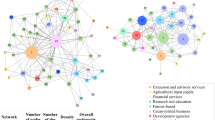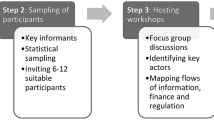Abstract
Insufficient attention has been paid to the methods used by rain-fed farmers to achieve sustainability in their livelihoods in the dry coastal savanna of Ghana. Official accounts describe such activities as declining under increased drought. Such assessments have not been based on sufficient evidence. Using a methodology based on actor network theory (ANT), social surveys and meteorological data, the results of this paper give evidence of a complex system of socio-environmental networking (SEN), incorporating both the utilisation and re-negotiation of socio-environmental prescriptions. These facilitate both livelihood survival and enhancement. In contrast to official solutions based on technical injections such as irrigation, farmers have evolved SEN as an effective strategy. It is concluded that these networks, which may be effectively appraised using ANT, are important factors for the sustainability of rain-fed farming.
Similar content being viewed by others
References
Adger W.N., Huq S., Brown K., Conway D. and Hulme M., 2003: Adaptation to Climate Change in the Developing World. Progress in Development Studies 3 (3): 179–195.
Afikorah-Danquah S., 2003: Local Resource Management in the Forest-Savanna Transition zone: the Case of Wenchi District, Ghana. University of Ghana, Accra.
Al-Hasan R. and Jatoe J.R.D., 2002: Adoption and Impact of improved Cereal Varieties in Ghana. Workshop on the Green Revolution in Asia and its Transferability to Africa. Foundation for Advanced Studies in International Development (FASID), Tokyo.
Ayariga G. and Roy A., 2002: Determinants of Success of Community-based Irrigation Dvelopment in the Upper East Region of Ghana: Case studies from the LACOSREP Programme. ZEF, Bonn.
Bediako J., 2004: The Ghanaian Chronicle 12 (83): 1–2.
Benneh G. and Agyepong G.A., 1990: Land Degradation in Ghana. Commonwealth Secretariat, London.
Bonsu M., 1998: A Study of Vulnerability of Cereal Production to Climate Change and Adaption Strategies in Ghana. EPA, Accra.
Callon M. and Law J., 1989: On the Construction of Socio-Technical Networks: Content and Context Revisited. Knowledge and Society, 57-83.
Campbell M., 1993: Implementing the Environmental Action Plan of the Environmental Protection Council: Problems and Prospects. Unpublished MPA Thesis. University of Ghana, Accra.
Campbell M., 1998: Interactions Between Biogeography and Rural Livelihoods in the Coastal Savanna of Ghana. Unpublished Ph.D. Thesis. University of London, Wye.
Carson W.P., 1985: State of Knowledge Report: The Ecology of the Accra-Winneba Plains with Some Aspects of Related Savanna Ecosystems. In Man and the Biosphere Project 3: Impact of Human Activities on the Structure and Productivity of the Savanna Ecosystem in Ghana Phase 1. 4–74. Environmental Protection Council, Accra.
Decher J. Kilpatrick C.W. and Bahian K.L., 2001: Small Mammal Zoogeography and Diversity in West African Forest Remnants. University of Vermont, Vermont.
Denton F., 2000: Gender Impact of Climate Change: A Human Security Dimension. Energia News 3 (3).
Denton, F., 2002: Climate Change Vulnerability, Impacts and Adaptation: Why Does Gender Matter? Gender and Development 10 (2): 10–18.
Dickson K.B. and Benneh G., 1995: A New Geography of Ghana 3rd ed. Longman, London.
Elliott J.A. and Campbell M., 2002: The Environmental Imprints and Complexes of Social Dynamics in Rural Africa: Cases from Zimbabwe and Ghana. Geoforum 33: 221–237.
Environmental Protection Agency (EPA), 2000: Ghana’s Initial National Communication under the United Nation’s Framework Convention on Climate Change. EPA, Accra.
FAO, 2003: Ghana. FAO, Rome.
Friends of the Earth, 1996: Ghana fisheries — What future. Foeline (4): 8–9.
Fosu K.Y., Adu J.K. and Ahene A.A., 2003: Climate, Water and Agriculture: Impacts on and Adaptations of Agro-Ecological Systems in Ghana. World Bank, Washington.
Ghana Meteorological Services Department Online, 2002: http://www.meteo.gov.gh/climate.html
Ghana Ministry of Agriculture, 2003: Land Use, Vegetation, Soils and Climate. Government of Ghana, Accra.
Ghana Irrigation Development Authority Report, 2000: GIDA, Accra.
Gyasi K.O. and Engel S., 2002: Community-based irrigation management in northern Ghana. ZEF, Bonn.
Homeku I., 2002: Thirty percent of game meatpPoisoned. Ghanaian Chronicle 29: 1.
Hutchinson R.A., 1962: Stock and Methods of Animals Husbandry. In: Wills J.B. (ed.), Agriculture and Land Use in Ghana. Oxford University Press, London.
Iddrisu A. and Tropp S., 1995: Land Degradation and Desertification in Ghana. In: Atchia M. (ed.), Environmental Management: Issues and Solutions, pp. 125–127. John Wiley and Sons, Chichester.
Jackson C., 1993: Doing what comes naturally? Women and environment in development. World Development 21 (12): 1947–1963.
Jackson C., 1994: Gender Analysis and Environmentalisms. In: Redclift M. and Benton T. (eds.), Social Theory and the Global Environment, pp. 113–149. Routledge, London.
Jampoh E.L., 1989: The Organisation of Fuelwood and Charcoal Trade in Ghanaian Urban Centres: Case Studies in Accra and Kumasi. Kwame Nkrumah University of Science and Technology, Kumasi.
Japan International Cooperation Agency, 1999: Country Profile on the Environment: Ghana. JICA, Tokyo.
Kollmann J., 2002: Game Theoretical Analysis of the Irrigation System in the Upper East Region of Ghana. University of Bonn, Bonn.
Laing E. (ed.), 1994: Ghana Environmental Technical Background Papers by the Working Groups. Government of Ghana, Accra.
Lane D.A., 1962: The Forest Vegetation. In: Wills J.B. (ed.), Agriculture and Land Use in Ghana. Oxford University Press, London.
Latour B., 1992: Where are the missing masses? The sociology of a few mundane artefacts. In: Bijker W. and Law J. (eds), Shaping Technology/Building: Society: Studies in Socio Technical Change, pp. 225–264. MIT Press, London.
Law J., 1992: Notes on the theory of the actor-network: Ordering, strategy and heterogeneity. Systems Practice 5: 379–393.
Lawson R.M., 1968: The Transition of Ghana’s Fishing From a Primitive to a Mechanised Industry. Transactions of the Historical Society of Ghana IX: 90–96.
Legon Agricultural Newsletter, 1966: 1 (2): 3-10.
Levine J.A., Weisell R., Chevassus S., Martinez C.D., Burlingame B. and Coward W.A., 2001: The work burden of women. Science 294: 812.
Mortimore M.J. and Adams W.M., 2001: Farmer adaptation, change and ‘crisis’ in the Sahel. Global Environmental Change 11: 49–57.
Murdoch J., 1997: Inhuman/nonhuman/human: Actor Network Theory and the Potential for a Non-Dualistic and Symmetrical Perspective on Nature and Society. Environment and Planning D: Society and Space 15: 731–756.
Murdoch J., 1998: The spaces of actor network theory. Geoforum 29 (4): 357–374.
Oduro W. Adomako E. and Bakarr M., 2001: Overview of the Bushmeat Issue in West Africa. Conservation International, Accra.
Opoku-Ankromah Y., 2000: Impact, Vulnerability and Adaptation Assessment on Water Resources. Environmental Protection Agency, Accra.
Raynaut C., 2001: Societies and nature in the Sahel: Ecological diversity and social dynamics. Global Environmental Change 11: 9–18.
Rocheleau D., Tomas-Slayter B. and Wangari E., 1996: Feminist Political Ecology. Routledge, London.
Rose Innes R., 1977: A Manual of Ghana Grasses. Ministry of Overseas Development, London.
Sally H. and Abernethy C.L. (eds), 2001: Private irrigation in sub-Saharan Africa: Regional seminar on private sector participation and irrigation expansion in sub-Saharan Africa, 22–26 October. International Water Management Institute, Accra.
Shirazu H.A., 1996: Irrigation development in Ghana. The Ghanaian Times 8-10-1996, 6.
Star S.L. 1996: To Classify is Human. Keynote address, ACM Hypertext ‘96, University of Maryland, Bethesda.
Technical Assistance to the Weija Irrigation Company (TAWEICO) 1996: Final Report. Technosynesis SpA, Rome.
Wamukonya N. and Rukato H., 2001: Climate Change Implications for Southern Africa: A Gendered Perspective. Minerals and Energy Policy Centre, Johannesburg.
Wamukonya N. and Skutsch M., 2002: Gender angle to the climate change negotiations. Energy and Environment 13: 115–124.
Whatmore S., 1997: Dissecting the autonomous self: Hybrid cartographies for a relational ethics. Environment and Planning D: Society and Space 15: 37–53.
Wildlife Division, 2003: Current Initiatives within the Wildlife Division. Government of Ghana, Accra.
Author information
Authors and Affiliations
Rights and permissions
About this article
Cite this article
Campbell, M.O. The role of socio-environmental networking in the sustainability of rain-fed agriculture in the coastal savanna of Ghana. GeoJournal 61, 79–88 (2004). https://doi.org/10.1007/s10708-005-1212-x
Published:
Issue Date:
DOI: https://doi.org/10.1007/s10708-005-1212-x




